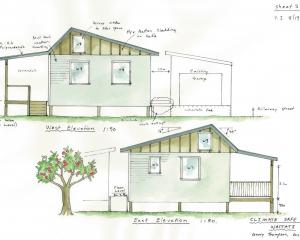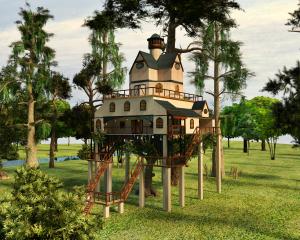
Making connections means we can make progress on several fronts at the same time, writes Scott Willis.

Our own house could almost be called a Climate Safe House (it’s suggested a climate safe house should be designed to be: transportable; healthy to live in; affordable; modular, so it can grow with your family; and energy efficient). It was certainly transported to our property and was, at the time, affordable.
But that’s where the similarity ends. Our house is more than 100 years old and was originally built before the days of insulation and double glazing. It had been a Maori Hill residence before being transported over the hill. We experienced a cold first few years with our firstborn stomping around in the claggy clay mud outside and condensation dripping down the windows inside, a retrofitted coal range fed with partially seasoned hawthorn barely keeping the kitchen warm...
Fuel poverty is something I am intimately familiar with.
Recently published research on the effects of fuel poverty puts an updated dollar figure on interventions such as insulation. According to Motu Economics, the benefits of insulation can be clearly counted. Researchers looked at the impact on residents from the first 45,000 homes retrofitted with insulation under the Warm Up NZ programme. They’ve calculated a benefit to cost ratio of 6:1 for the most vulnerable populations (children and old people). That simply means that there’s a saving of $6 in return for every $1 spent.
In 2009, I was lucky enough to be involved in a pilot of the Warm Up NZ programme. Our trust (Blueskin Resilient Communities Trust) proposed running an insulation pilot to the Energy Efficiency and Conservation Authority. We then facilitated the roll-out of insulation to more than 400 homes in a little over four months.
During that time we got to experience the diversity of fuel poverty in our area first hand. Old people suffering from serious respiratory ailments because their homes were cold and damp. Children off school with coughs and colds. The choking smell of cheap and dirty coal being burnt just to keep the chills at bay while our CO2 emissions rise. The research now shows that the insulation programme prevents one death for every 1000 insulated homes. But it also reduces misery and carbon emissions.
And carbon emissions are what are causing climate change. The lag time between emissions released into the atmosphere and a rise in temperature can be relatively small, say a decade or more. So we’re not getting the full effect of what we emit today right now: it’s coming soon though. Already in low-lying areas ground-water levels are rising and in flood zones, floods are more frequent. That is making the problem of fuel poverty even more complex.
Prof David Griggs, director of the Monash Sustainable Development Institute in Australia, at a recent talk in Dunedin, set out an explanation of the Sustainable Development Initiative led by the United Nations. In particular, he pointed to the interlinkages between different goals, and how it is impossible to isolate the goals from each other. In other words, to deal with complexity, we need to think holistically.
Ending [fuel] poverty, ensuring healthy lives and promoting wellbeing, making our city and its settlements inclusive, safe, resilient and sustainable, and taking climate action, these are four of the key UN goals that can be addressed through taking a holistic approach to the growing housing challenges in Dunedin and beyond.
Yes, the interlinkages make it complex. But look at it another way: when early humans faced new environmental challenges (between 2 million and 200,000 years ago), larger and more complex brain evolution took place. Environmental factors helped us become all we have become today. So increasing complexity and environmental challenge could even stimulate a further evolutionary leap, who knows?!
However, in the cold hard light of the present day we have to acknowledge that many of our homes that make up the "built environment" are not only poor quality but they are also now at increased environmental risk. What can we do? What do we need to address the challenges?
Firstly, we need clear risk-management guidance from our local council in plans, strategy and regulatory controls. This work is already substantially advanced, with most strategies completed and the Second Generation District Plan moving through the final stages prior to confirmation.
Secondly, we need an enhanced frontline community sector, with experienced organisations working in partnership with councils to develop rich community engagement and co-development of solutions.
Thirdly, we need national recognition and resourcing of the challenge. Government has a unique opportunity to use the general taxation base for priority work and can also instigate targeted taxation, like a carbon tax, that can help mitigation as well as adaptation.
While I think we need all three "parties" (community organisations and local and national government) involved to be effective in addressing the challenge, we can’t expect that everyone will come to the table at the same time. The "front line" or community sector is already stretched very thin but certainly has the motivation.
So when I look at the challenges, I feel some hope. Together we have the capacity and the potential. We won’t remove fuel poverty overnight, but if we understand how addressing fuel poverty will also address climate change and increase wellbeing to make Dunedin one of the world’s great small cities, then we have every chance of finding practical and workable solutions.
- Scott Willis is the project manager of Blueskin Energy Ltd. Each week in this column, one of a panel of writers addresses issues of sustainability.
Defining fuel poverty
• Fuel poverty is typically described in New Zealand as existing if householders would need to "spend more than 10% of the total household income on all household fuels to achieve a satisfactory indoor environment".
Things we can do
• If you are a landlord or a tenant, insulation subsidies are currently available. Contact the Cosy Homes Trust for details: www.cosyhomes.org.nz
• The Climate Safe House project is looking for volunteers: http://climatesafehouse.nz/
• Keep your eyes open for public forums organised by the DCC and get along when you can: www.dunedin.govt.nz
• Follow the Climate Safe House facebook page for articles, events and opinion: www.facebook.com/ClimateSafeHouse
• Get some free Cosy Energy Advice and take action on that advice: Local call (03)9291323
• Prepare an emergency kit (not only will you be better prepared if there’s an emergency, you’ll also begin mentally preparing for our changing world.












